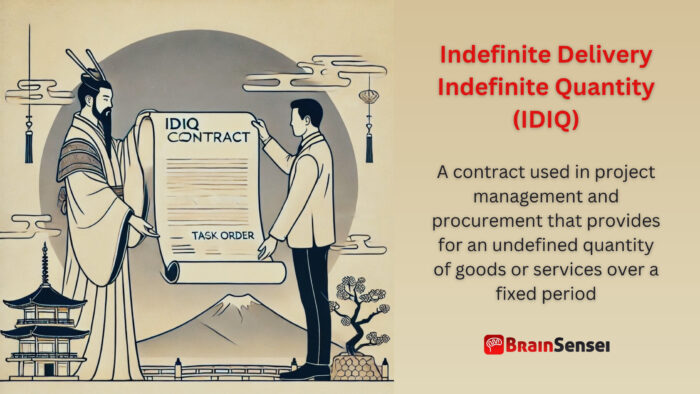
Indefinite Delivery Indefinite Quantity (IDIQ)
What is Indefinite Delivery Indefinite Quantity (IDIQ)?
Indefinite delivery indefinite quantity (IDIQ) is a contract used in project management and procurement that provides for an undefined quantity of goods or services over a fixed period. Government agencies and large organizations commonly employ IDIQ contracts to streamline procurement and respond flexibly to changing project requirements.
Key Takeaways
- Flexibility: IDIQ contracts allow for adjustments in the delivery schedule and order quantities based on project needs.
- Cost efficiency: IDIQ contracts reduce administrative costs and the time spent on repeated procurement processes by pre-negotiating rates and terms.
- Government and Large-Scale Use: Frequently used by federal and state agencies to facilitate streamlined procurement.
- Task Order-Based Execution: Work is assigned through task or delivery orders as specific needs arise within the contract’s scope.
- Defined Ceiling Value: The contract specifies a maximum value and prohibits exceeding it over time.
Understanding Indefinite Delivery Indefinite Quantity (IDIQ)
How It Works
Indefinite delivery indefinite quantity (IDIQ) contracts provide a framework for multiple orders for supplies or services over a defined contract period. Instead of setting a fixed quantity at the outset, an IDIQ contract establishes a minimum and maximum order quantity. Individual task or delivery orders are issued as project needs emerge.
Notes
- Not a Guarantee of Work: Awarding an IDIQ contract does not obligate the issuing agency to purchase beyond the minimum quantity
- Competitive Task Orders: While an IDIQ contract may be awarded to multiple vendors, competition can still occur at the task order level
- Streamlined Procurement: The established contract allows agencies to reduce procurement lead time
- Suitability: Best suited for projects with unpredictable demand or evolving requirements
Related Terms
- Task Order Contract: This contract allows for ordering services as needed through individual task orders
- Multiple-Award IDIQ: An IDIQ contract awarded to multiple vendors, allowing for competition at the task order level
- Fixed-Price Contract: A contract where the cost is predetermined and does not change regardless of actual expenses
- Time and Materials Contract: A contract where the buyer pays for actual labour hours and materials used
- Procurement Strategy: The overarching approach used to acquire goods and services efficiently
Examples of Indefinite Delivery Indefinite Quantity (IDIQ) in Action
Construction Industry
A federal agency requires ongoing maintenance and minor construction work across multiple facilities. Instead of issuing separate contracts for each job, the agency establishes an IDIQ contract with numerous prequalified construction firms. As maintenance needs arise, task orders are issued under the IDIQ contract, saving time and ensuring quick service delivery.
For example, a military base may need repairs on runways, barracks, and office buildings over the course of five years. Rather than undergoing a lengthy bidding process for each task, the IDIQ contract allows pre-approved contractors to be assigned work quickly. This IDIQ contract process improves response time, ensures cost control, and reduces administrative burden. Furthermore, the contract may include energy-efficiency upgrades, allowing the agency to implement sustainable improvements over time.
IT Services
A government department needs cybersecurity monitoring and software updates over the next five years. Instead of defining specific quantities upfront, they award an IDIQ contract to a technology provider. As security threats evolve, the department issues task orders for updated solutions, ensuring continuous protection while maintaining budget flexibility.
Consider a scenario in which a federal agency contracts a cybersecurity firm under an IDIQ contract to monitor its digital infrastructure continuously. The agency initially requires penetration testing. However, as new cyber threats emerge, it issues additional task orders for real-time threat detection, firewall upgrades, and employee training programs. This proactive approach to issuing task orders under the existing contract ensures that the agency stays ahead of cyber risks without frequently renegotiating contracts.
Additionally, in the private sector, a multinational corporation might use an IDIQ contract for IT services across global branches. Instead of securing separate agreements for each location, the company engages a single IT vendor under an IDIQ arrangement. As new offices open or existing systems require updates, the corporation can issue task orders for equipment installation, cloud migration, or software support, ensuring seamless operations worldwide.
Defence Procurement
The military requires periodic supplies of specialized equipment but cannot predict exact quantities. An IDIQ contract is issued to multiple vendors, allowing for rapid equipment procurement as demand arises. This approach ensures operational readiness without excessive inventory costs.
For instance, the U.S. Department of Defense might enter into an IDIQ contract for tactical gear, medical supplies, and field rations. Given the unpredictable nature of global military operations, this approach allows defence units to request supplies as needed rather than overstocking materials that may become obsolete. When deployments increase, additional task orders ensure troops receive necessary equipment promptly.
An example is aircraft maintenance for fighter jets. Rather than negotiating individual contracts for each repair, an IDIQ contract enables the quick issuance of work orders for engine overhauls, avionics upgrades, and structural modifications as needed. This approach minimizes downtime and ensures fleet readiness without procurement delays.
Additionally, NATO and allied forces often leverage IDIQ contracts for multinational defence projects. By standardizing procurement across multiple countries, these contracts allow member nations to acquire weapons systems, training services, and logistical support in a coordinated manner, enhancing military cooperation and efficiency.
Use Cases of Indefinite Delivery Indefinite Quantity (IDIQ)
North America (Infrastructure Modernization)
The U.S. Army Corps of Engineers uses IDIQ contracts for infrastructure repair projects across military bases. This approach allows the agency to allocate funds efficiently while responding dynamically to maintenance needs. The IDIQ model ensures facilities remain operational without long procurement delays, addressing urgent issues like bridge repairs, water treatment upgrades, and energy conservation initiatives.
Europe (Transportation Services)
The European Union uses IDIQ contracts for public transportation projects, allowing for phased upgrades and procuring new equipment over time. By issuing task orders as needed, cities can modernize metro systems, expand bus routes, and upgrade railway networks efficiently. The flexibility of IDIQ contracts prevents unnecessary spending on underutilized infrastructure while ensuring that transportation services evolve with population growth and technological advancements.
Asia (Telecommunications Expansion)
An Asian government entity uses IDIQ contracts to deploy broadband infrastructure in rural areas. Instead of committing to a fixed number of installations, the contract allows service providers to expand coverage progressively based on demand and available funding. Using IDIQ contracts, governments can connect remote villages to high-speed internet without the risk of under- or over-investment in infrastructure. Additionally, task orders can be issued for equipment maintenance, ensuring the longevity and reliability of broadband services.
Africa (Renewable Energy Projects)
Several African nations use IDIQ contracts to expand solar and wind energy capacity. Governments issue task orders for installing solar farms, grid enhancements, and battery storage facilities. As energy needs fluctuate, they can create new task orders to scale projects accordingly. This model supports sustainable development while minimizing financial risks for governments and private-sector partners.
Middle East (Defense and Security)
Countries in the Middle East frequently use IDIQ contracts to procure military and security equipment, including drones, armoured vehicles, and surveillance systems. This approach allows governments to adapt their defence capabilities to emerging threats without committing to a fixed procurement quantity.
These use cases demonstrate how IDIQ contracts provide efficiency, flexibility, and cost-effectiveness in various industries and regions worldwide.
Best Practices for Implementing Indefinite Delivery Indefinite Quantity (IDIQ)
Implementing IDIQ contracts effectively requires adherence to best practices that ensure efficiency, cost-effectiveness, and compliance with regulatory requirements. The following key strategies help organizations maximize the benefits of IDIQ contracts:
Clear Scope Definition
One of the most critical factors in a successful IDIQ contract is clearly defining the scope of work. Organizations should outline the specific types of goods or services covered, performance standards, and contract duration. Without a well-defined scope, misunderstandings can arise between the buyer and the vendor, leading to inefficiencies and potential disputes.
Specifying service-level agreements (SLAs) and performance metrics in the contract also ensures accountability. For example, an IT services contract involving cybersecurity monitoring should explicitly state the expected response time for threat mitigation.
Vendor Performance Management
Monitoring vendor performance is crucial to maintaining service quality and ensuring compliance with contract terms. Agencies should implement key performance indicators (KPIs) to evaluate contractor efficiency, response time, and deliverable quality. Conducting periodic performance reviews helps identify underperforming vendors and allows for necessary corrective actions.
Establishing an effective communication channel between buyers and vendors is equally important. Regular meetings, reporting structures, and feedback mechanisms can ensure project goals and contract requirements are aligned.
Budget Control and Financial Oversight
Organizations should establish strict budget controls and financial monitoring systems to prevent cost overruns. Assigning a dedicated financial oversight team can help track expenditures against the contract’s ceiling value and prevent unauthorized spending.
Sometimes, agencies implement cost-tracking software to monitor spending in real-time. This practice allows decision-makers to issue new task orders strategically without exceeding the contract’s budget limitations.
Legal and Regulatory Compliance
Compliance with procurement regulations is a fundamental requirement for IDIQ contracts, especially in government contracting. Organizations should stay informed about legal frameworks, such as the Federal Acquisition Regulation (FAR) in the United States or similar regulations in other countries.
Additionally, contracts should include clauses addressing intellectual property rights, confidentiality agreements, and conflict resolution mechanisms. Failing to comply with regulatory requirements can result in penalties, contract termination, or reputational damage.
Efficient Task Order Issuance
One primary benefit of an IDIQ contract is the ability to issue task orders quickly. However, inefficient task order processing can lead to project delays and missed deadlines. Organizations should implement streamlined task order approval workflows, ensuring requests are reviewed and processed within a specified timeframe.
Automated procurement systems can also reduce manual paperwork and increase transparency in task order issuance. By integrating digital contract management tools, agencies can track task order progress, approvals, and fulfillment in real time.
Competitive Vendor Selection
When awarding an IDIQ contract, organizations should encourage competition among vendors to achieve the best value. While some IDIQ contracts are sole-source, multiple-award IDIQ contracts allow multiple vendors to compete at the task order level, fostering price competitiveness and service innovation.
Encouraging vendor diversity by including small businesses, minority-owned firms, and specialized contractors can enhance contract performance. Government agencies often set aside portions of IDIQ contracts for small businesses to promote economic growth and innovation.
Risk Management Strategies
Risk assessment should be an ongoing process in IDIQ contract management. Identifying potential risks—such as supply chain disruptions, vendor insolvency, or regulatory changes—allows organizations to develop mitigation strategies.
For example, establishing contingency plans for high-priority services ensures that essential operations continue even if a primary vendor fails to deliver. Agencies can also require backup suppliers or alternative sourcing strategies to minimize disruptions.
Continuous Improvement and Lessons Learned
Evaluating the effectiveness of an IDIQ contract throughout its lifecycle helps organizations refine their procurement strategies. Conducting post-task order reviews and gathering feedback from stakeholders can identify areas for improvement.
Organizations should document lessons learned and update contract terms for future IDIQ agreements to enhance efficiency and effectiveness. Adjusting terms based on previous experiences ensures that each new IDIQ contract incorporates best practices and avoids past pitfalls.
Conclusion: By following these best practices, organizations can maximize the efficiency, cost-effectiveness, and flexibility of IDIQ contracts. Proper planning, vendor management, financial oversight, and compliance measures ensure these contracts deliver optimal value for buyers and suppliers. Implementing streamlined processes for task order issuance and performance monitoring further strengthens IDIQ contract execution, making them a powerful tool in modern procurement strategies.
IDIQ: Common Mistakes and Issues
While IDIQ contracts offer flexibility and efficiency, they are not without challenges. Mismanagement or lack of oversight can lead to inefficiencies, legal disputes, or financial overruns. The following sections describe common mistakes and issues associated with IDIQ contracts and how to mitigate them.
Poorly Defined Requirements
One of the most frequent pitfalls of IDIQ contracts is the lack of a clearly defined scope of work. Without explicit specifications, vendors may interpret requirements differently, leading to inconsistencies in deliverables. This lack of precise specifications can cause disputes, project delays, and cost overruns. To avoid these pitfalls, contracting entities should provide clear task descriptions, performance metrics, and deliverable expectations for each order issued under an IDIQ contract.
Underutilization of the Contract
Organizations sometimes fail to maximize the benefits of an IDIQ contract by not issuing enough task orders. This underutilization can lead to wasted administrative efforts in setting up the contract while failing to provide the anticipated cost and time savings. Agencies should monitor contract usage and issue task orders in alignment with projected needs.
Budget Overruns and Lack of Financial Oversight
IDIQ contracts can easily exceed budgetary limits if financial controls are not in place. Without effective tracking, an organization may issue task orders that push the total contract value beyond the allocated budget. Organizations should implement regular financial audits and tracking systems to monitor spending and ensure compliance with the contract’s ceiling value.
Limited Vendor Competition
Some IDIQ contracts may be awarded to too few vendors, reducing competition at the task order level. When competition is limited, agencies may face higher costs and suboptimal performance. To prevent this, agencies should consider multi-award IDIQ contracts, allowing several vendors to bid on individual task orders and fostering a competitive pricing structure.
Slow Task Order Processing
One key benefit of IDIQ contracts is the ability to issue task orders quickly. However, bureaucratic inefficiencies can slow the approval process, negating this advantage. Delays in processing task orders can hinder project timelines and affect service delivery. Establishing standardized workflows and leveraging automated procurement systems can significantly enhance efficiency.
Insufficient Contractor Performance Monitoring
Failing to track contractor performance can lead to inconsistent quality in deliverables. Agencies should establish key performance indicators (KPIs) and conduct regular reviews to assess vendor performance. If contractors fail to meet expectations, project managers should promptly take corrective actions to ensure contractors meet project objectives.
Lack of Training and Familiarity with IDIQ Procedures
Many procurement officers and project managers may not be well-versed in IDIQ contract mechanisms, leading to mismanagement. Organizations should make training programs and guidance materials available to ensure all stakeholders understand how to use and manage IDIQ contracts efficiently.
Compliance and Legal Risks
Regulatory and legal compliance is critical for IDIQ contracts, especially in government procurement. Contracts must adhere to federal, state, or international acquisition regulations. Any deviation from compliance requirements can lead to audits, penalties, or contract termination. Agencies should have a legal review process to ensure all contracts and task orders meet applicable regulations.
Communication Breakdowns
Effective communication between agencies and vendors is crucial for the success of the IDIQ contract. Miscommunication can lead to incorrect task order execution, delays, and conflicts. Organizations should establish structured communication protocols, regular meetings, and documentation practices to align all stakeholders.
Conclusion: IDIQ contracts provide substantial benefits in procurement flexibility and efficiency, but they require diligent management to avoid common pitfalls. By ensuring well-defined requirements, competitive vendor selection, financial oversight, timely task order processing, and intense contractor performance monitoring, organizations can maximize the effectiveness of their IDIQ contracts. Implementing best practices and avoiding common mistakes will help maintain compliance, reduce costs, and achieve successful project outcomes.
IDIQ: Frequently Asked Questions (FAQs)
What are the advantages of an IDIQ contract?
IDIQ contracts offer flexibility, reduced administrative burden, and quicker procurement timelines by pre-negotiating contract terms while allowing dynamic task ordering.
Who uses IDIQ contracts?
Government agencies, military branches, and large corporations frequently use IDIQ contracts for services and supply procurement where demand is variable.
How does an IDIQ contract differ from a fixed-price contract?
A fixed-price contract commits to a specific quantity and price, while an IDIQ contract allows for variable quantities within a defined period.
Can an IDIQ contract be used for services?
Yes, organizations can structure IDIQ contracts for goods and services, such as consulting, IT support, or construction.
Is an IDIQ contract legally binding?
Yes, an IDIQ contract is a legally binding agreement, but the agency must issue task orders to initiate work beyond the minimum guarantee.
Additional Resources
Preparing for a PMI certification?
- Exam Prep Courses: PMP®, CAPM®, and PMI-ACP®
- Exam Simulators: PMP®, CAPM®, PMI-ACP®, PMI-PBA®, PMI-RMP®, PMI-SP®, PgMP®, and PfMP®
- Professional Development Units (PDUs): 15, 30, and 60 PDU Bundles



